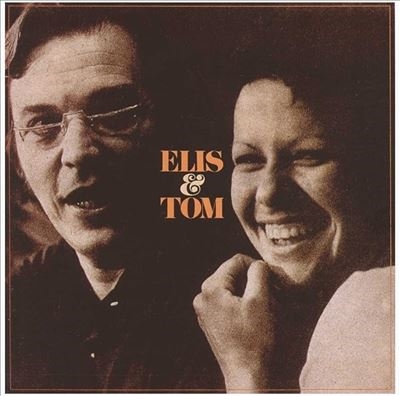歓喜!ボサノヴァ屈指のマスターピース『エリス&トム』がリリース50周年を記念して久々のリイシュー!!
ボサノヴァの巨匠、アントニオ・カルロス・ジョビンと当時ブラジルで最も人気を集めていた歌手、エリス・レジーナの奇跡的な共演盤『エリス&トム』(1974)がリリース50周年を祝して待望の復刻。ボサノヴァ特有のウィスパーボイスとは縁遠いパワフルな歌唱を特徴とするエリスと、「鉛筆よりも消しゴムが好きだ」という発言が象徴するように、ミニマルな作風を特徴とするジョビン。『エリス&トム』は、一見相反するように感じられる二人の表現が一つに溶け合った名作だ。
このアルバムを象徴する曲と言っていい冒頭の「Aguas De Marco(三月の雨)」は、エリスとジョビンのデュエットで歌われる。掛け合いの最中にエリスが笑い出してしまうほどにリラックスしたムードの中で録音されており、カバーの多い同曲の中でも特に人気が高い。さらに特筆すべきは、「Chovendo na Roseira(ばらに降る雨)」が収録されている点だ。ジョビンの楽曲の中でも特にクラシックからの影響が色濃いこの曲は、CTIからリリースされたジョビンのソロ作『Stone Flower』(1970)に収録されたインスト曲「Children's Game」に新たに歌詞を付けたもの。メロディーがジェットコースターのように上下するこの難曲を、エリスは巧みに歌い上げ自らのものとしている。多くのカバーが存在する人気曲だが、本作に収録されたものがベストテイクといえるだろう。
他にも、ドキュメンタリー映画のタイトルにも据えられた「So Tinha de Ser com Voce」、ボサノヴァ・クラシックといえるしっとりとしたバラード「Corcovado」、重厚なストリングスで彩られた「Retrato em Branco e Preto(白と黒のポートレート)」など、どれも名演ばかり。ラストは、ジョビンのピアノのみの質素な演奏が喪失感を引き立てる「Inutil Paisagem(無意味な風景)」で静かに幕を閉じる。ボサノヴァどころかブラジル音楽を代表する一枚といえる本作は、何としてもレコードで持っておきたい一枚かと。ぜひこの機会に!
発売・販売元 提供資料(2024/08/01)
This beautiful -- and now legendary -- recording date between iconic Brazilian vocalist Elis Regina and composer, conductor, and arranger Tom Jobim is widely regarded as one of the greatest Brazilian pop recordings. It is nearly ubiquitous among Brazilians as a household item. Regina's voice is among the most loved in the history of Brazilian music. Her range and acuity, her unique phrasing, and her rainbow of emotional colors are literally unmatched, and no matter the tune or arrangement, she employs most of them on these 14 cuts. Another compelling aspect of this recording is the young band Jobim employs here and allows pretty free rein throughout. He plays piano on eight of these tracks, and guitar on two others, but the fluid, heightened instincts of these players -- guitarist Oscar Castro-Neves, Luizao Maia on bass, drummer Paulinho Braga, and pianist Cesar Mariano -- reveal them to be at the top of their game for this rather informal date that does include a few numbers with a full orchestra. That said, most of these songs were completed as first takes with very little overdubbing. The ballads are stunning -- check"Modinha," written and arranged by Jobim. The chart, even with an orchestral backing, is amazingly terse because the composer knew Regina worked best within minimal settings. Only two minutes and 16 seconds in length, it nonetheless captures the Portuguese notion of "saudade" perfectly. Of course, most of these tunes are bossa novas. The opening "Aguas de Marco" features a deceptively simple cat-and-mouse vocal call and response, kicking the disc off on a light, cheerful note; it's a delightful and very sophisticated number, but it feels effortless. "Triste" is one of Jobim's finest tunes, and there is scarcely a better version of it than this one. Even with electric guitars (complete with a semi-funky solo in the middle eight) on top of the nylon strings, the gauzy yet pronounced rhythms and the languid melody delivered by Regina are gorgeous. "Corcovado" is done with an orchestra, full of lilting flutes and a deep string backdrop. It is mournful and sensual. Jobim plays guitar and piano here, and adds a hushed backing vocal to Regina's refrains. It's an unusual reading, but a stellar one. "Brigas, Nuncas Mais" is a wonderfully accented -- if brief -- bossa nova with all the percussion just above the threshold of hearing. It's all guitars, bass, and Regina in the first verse before the Rhodes piano and counterpoint enter near the end. She does more to express the true elegant sensuality of the bossa nova in a minute and 13 seconds than some singers have in a lifetime. Jobim's classic jazz ballad "Inutil Paisagem" is very difficult to deliver well, because it requires incredible restraint and emotion. Accompanied only by Jobim's piano -- and his all-but-whispered backing vocal -- this is truly one of Regina's greatest performances of the 1970s. It closes the album on a stunning high note, leaving nothing to be desired by the listener. ~ Thom Jurek
Rovi






